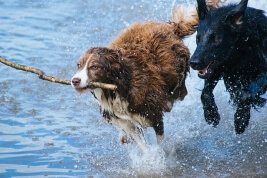 These wonderful days are perfect for spending outdoors with the dogs,
and hopefully there are still many more to come. Lazing around the yard,
and going for hikes and swims are popular activities. Here are a few
tips for making sure the dogs remain
safe and happy while enjoying warm-weather pursuits.
These wonderful days are perfect for spending outdoors with the dogs,
and hopefully there are still many more to come. Lazing around the yard,
and going for hikes and swims are popular activities. Here are a few
tips for making sure the dogs remain
safe and happy while enjoying warm-weather pursuits.
- Don't allow pets to nosh on garden plants, many of which are toxic to pets. Know the symptoms of poisoning.
- Always have fresh, cool water available to your pet, along with a cooler shady area where he can escape from the heat of the sun.
- If you are in an area where fleas, ticks, or heartworm are concerns, consult with your vet about appropriate measures for protecting your dog.
- Show good etiquette when bringing your dog to off-leash parks or dog beaches.
- Never leave your pet unattended in a car on a warm or hot day - temperatures inside the car can rise rapidly and cause serious illness or even death, even when the car windows are open and the car is parked in the shade. Leave your pet at home where he will be cool and safe. If you wouldn't leave a baby alone in the car, don't leave your pet!
- If your dog isn't accustomed to hiking, take him on shorter hikes first. Know your dog's physical limits and comfort level.
- Hike during the cooler parts of the day, like early morning or evenings.
- Always bring enough water for your dog. To keep the water cool for a longer time, freeze a bottle of water before the hike - the ice will gradually melt throughout the hike.
- Leash your dog on hiking trails and in any other area where wildlife encounters are common. Dogs should only be permitted off-leash where allowed, and only if they have reliable recall.
- Try not to bring your dog into the backcountry where wildlife encounters are more likely.
- Don't allow dogs to chase or harass wildlife of any kind.
- Try to avoid areas with rough or difficult terrain, like sharp rocks or loose scree. A dog's paws are sensitive and can be injured. Consider the use of dog boots if hiking in an area with lots of rough terrain.
- Be alert to signs of exhaustion in your dog. Take rests when needed and offer water regularly.
- Don't force a dog into the water if he or she doesn't want to go.
- Get your dog a life vest or life jacket, especially if he or she isn't a strong swimmer or is unaccustomed to the water (not all dogs are natural born swimmers!). Dogs on boats should also wear life jackets just in case.
- Don't allow pets to swim in areas with fast currents or rough waves.
- Watch your dog for signs of dehydration and exhaustion. Your dog doesn't decide when he needs a break.. you decide when your dog has had enough!
- Rinse your dog off after playtime in the water. Swimming pool chemicals can irritate his skin, and lake or ocean water also has its own nasties that can cause itching in your dog.
- Dry your dogs ears afterwards to prevent ear infections. If your dog is prone to ear infections, use a drying ear rinse specifically formulated for dogs).
- Always supervise your dog in and around water.
"The most affectionate creature in the world is a wet dog." (Ambrose Bierce)
Comments (0)